Free AI Literature Review Generator
Create Reviews, Edit Online with AI-Powered Literature Review Editor
Template.net’s Free AI Literature Review Generator helps you draft high-quality literature reviews in seconds. Edit online with your brand logo, fonts, tone, and custom elements to ensure every review is personalized and professional. Whether you're writing for research papers, academic submissions, or thesis background, stay on-brand and on-point. Download in multiple formats, share instantly, and communicate with clarity and confidence.
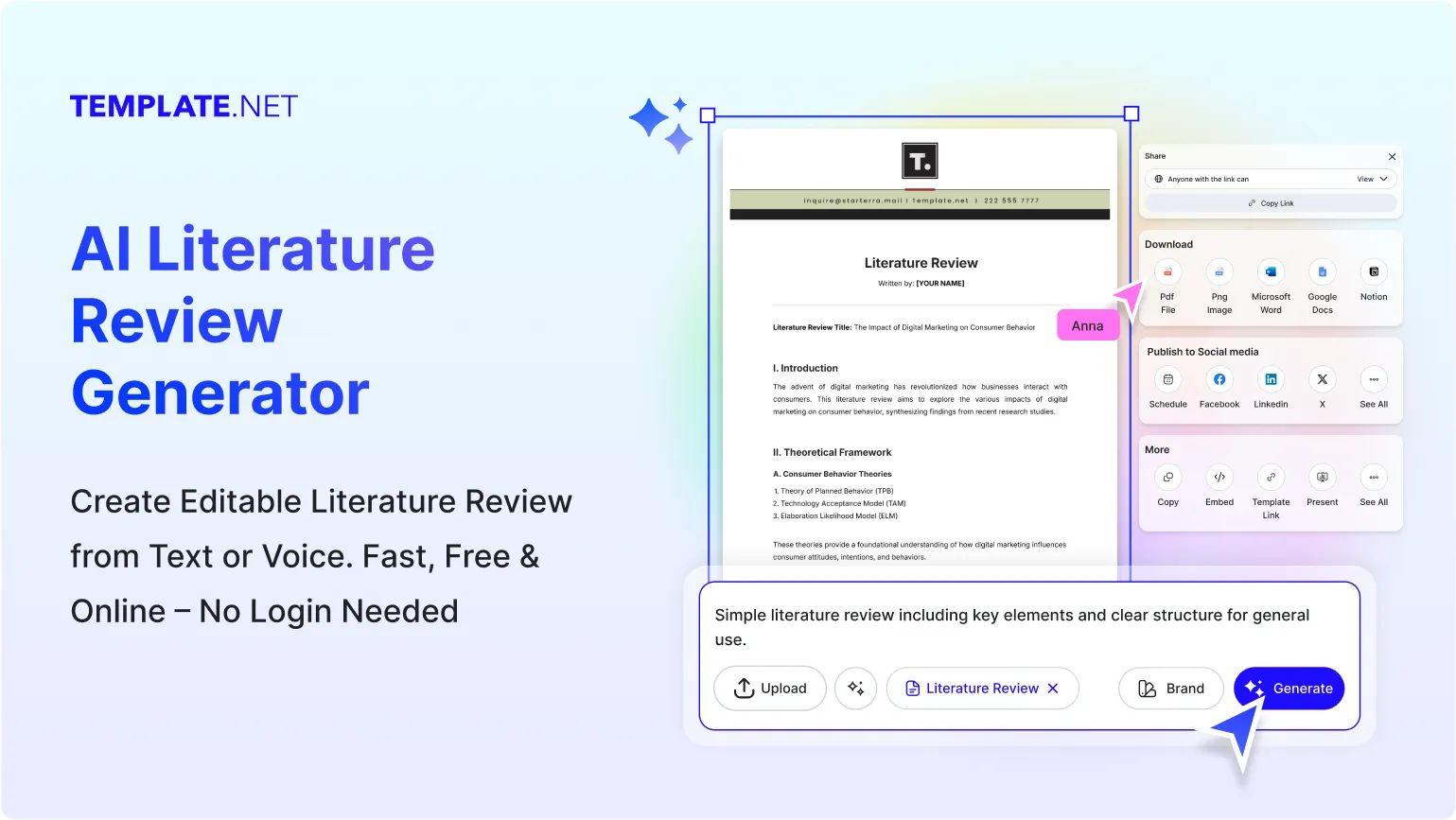
Write Custom, Professional Literature Reviews in Seconds
From thesis reviews to academic critiques, our AI-powered document writer helps you craft polished, on-brand content in any format, tone, or language, no blank pages, no formatting guesswork.
AI Brand Voice
Choose from formal, critical, analytical, or conversational tones. AI reviews your input to match your message intent, whether it’s scholarly research or a general overview. You can also specify content style, citation tone, and complexity level to ensure your review reads consistently.
AI-Smart Formatting Suggestions
Get instant suggestions for improving academic structure, logical flow, and section formatting, especially useful for lengthy literature reviews.
Multiple Review Formats Supported
Generate a wide range of review types including literature summaries, systematic reviews, meta-analyses, annotated bibliographies, research backgrounders, and more.
Academic & Professional Formatting
Apply academic layouts with correct spacing, headers, font styles, and document structures, ensuring your literature review aligns with institutional or journal formatting guidelines.
Smart Personalization
Auto-fill author names, study titles, research institutions, and more. AI identifies patterns and reduces repetitive sections.
Auto-Suggested Headings & Sections
Let AI recommend structured sections like Introduction, Methodology, Findings, and Conclusion to improve readability and coherence.
Multilingual Document Generation
Generate literature reviews in global languages using text or voice prompts.
Languages supported: English, Spanish, French, Hindi, Arabic, Chinese, German, Portuguese, Russian, Japanese, Korean, Turkish, Vietnamese, Urdu, Polish, Thai, and more. Ideal for international publications or bilingual research.
Voice-Powered Drafting
Speak your prompt and let AI generate your literature review, fast and hands-free.
Fully Customizable Layouts
Adjust section titles, spacing, fonts, and layout styles. Control headings, margins, and citations from hundreds of academic templates.
Branding and Visual Control
Apply academic logos, footers, and visual consistency across citations and formatting.
Citations & Source Generation
Automatically generate APA, MLA, or Chicago-style citations from links, pasted abstracts, DOIs, or reference inputs, perfect for academic integrity.
Real-Time Proofreading
Check for grammar, citation style, tone, and spelling in real-time. Avoid submission rejections with polished outputs.
Rewriting & Content Expansion
Ask AI to improve, shorten, or expand any paragraph with scholarly tone and context-rich suggestions.
Export in Multiple Formats
Download your review in DOCX, PDF, TXT, PNG, or HTML. Instantly save to Google Docs, Dropbox, or email platforms.
Real-Time Collaboration
Invite co-authors, editors, or reviewers to collaborate live. Comment, revise, and work together in your shared workspace.
Secure Cloud Workspace
Store research drafts securely, manage citations, and control access for teams or professors in your personal cloud.
Translate Full Reviews Instantly
Convert academic reviews into other languages in one click for ideal for global research publishing.
Share or Embed Anywhere
Publish via links, QR codes, or embed codes to include in research journals, blogs, or knowledge repositories.
Add Signature Blocks
Insert approval sections or digital signature areas for formal academic submissions.
Attach Files & Media
Include PDFs, graphs, images, or reference papers directly inside your literature review.
Add Visual References
Enhance your literature review with graphs, snapshots, tables, or academic illustrations, ideal for presenting data trends or summarizing research visually.
Add Tables and Structured Data
Build clean, academic-style tables to organize author names, publication years, methodologies, sample sizes, findings, or comparison matrices, perfect for structured reviews and evidence maps.
Add Charts and Graphs
Visualize review data with bar charts, line graphs, or pie charts. Great for showing trends in publication years, topic distribution, citation counts, or methodology usage across studies.
Highlight Key Themes & Concepts
Automatically extract and highlight recurring keywords, topics, or concepts across your sources, ideal for structuring your review by themes or research gaps.

How to Write a Free AI-Generated Literature Review
Just enter a prompt, customize the draft, and export your polished literature review in minutes, no formatting, no friction.
Step 1: Start with a Prompt
Type or speak your review’s purpose such as: “Literature review on climate change impact,” “Review of studies on machine learning algorithms,” or “Annotated bibliography for social psychology.” Our AI instantly understands your intent and begins drafting your content.
Step 2: Generate and Edit
Within seconds, you’ll see a professionally structured literature review tailored to your prompt. You can refine headings, tone, or length, or regenerate multiple structured versions to explore different formats.
Step 3: Finalize and Share
Add citation styles, sources, or visual enhancements. Then export your review in DOCX, PDF, TXT, or share it instantly via Email, LinkedIn, WhatsApp, Facebook, X (Twitter), Pinterest, Reddit, or generate a live link or QR code for easy academic sharing.
Work Smarter and Promote Your Brand
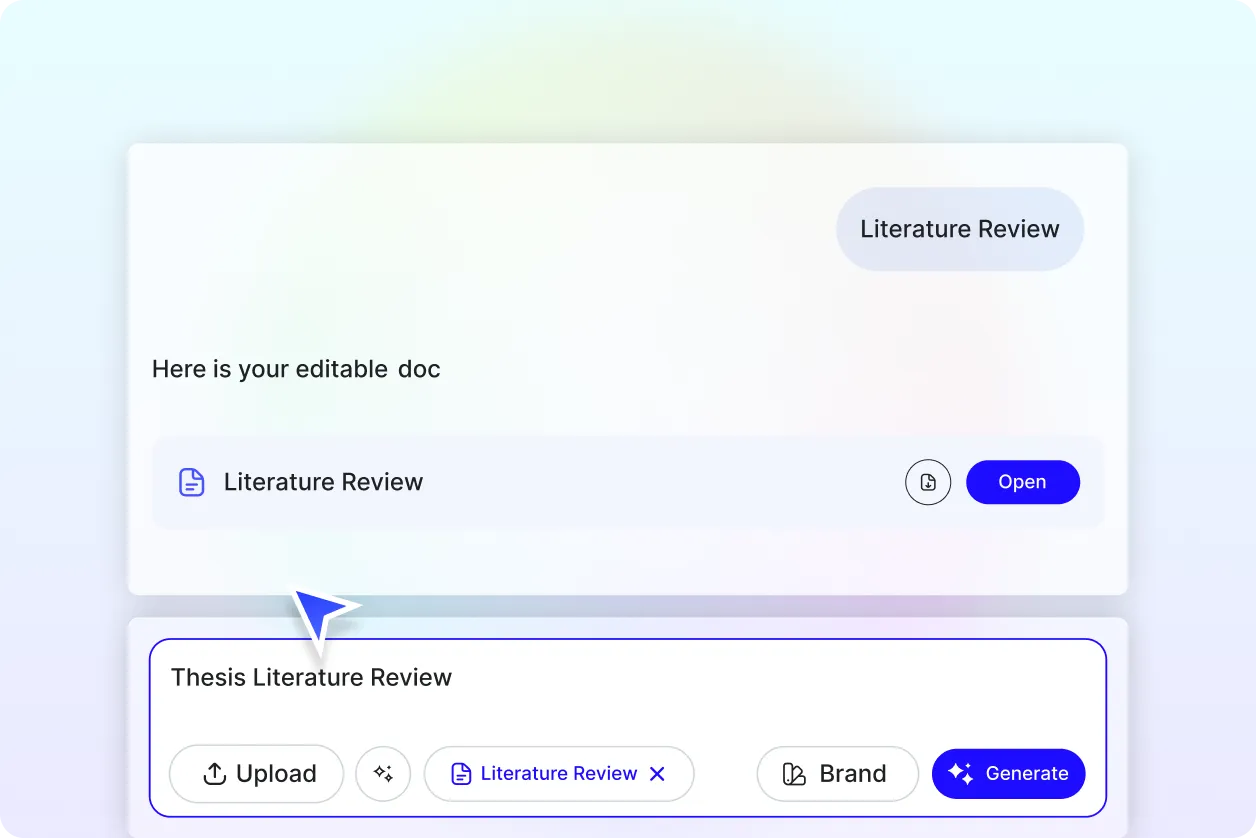
Generate Literature Reviews That Represent You
Apply your company’s brand style in seconds. From headers to voice, every element of your literature review reflects your identity.
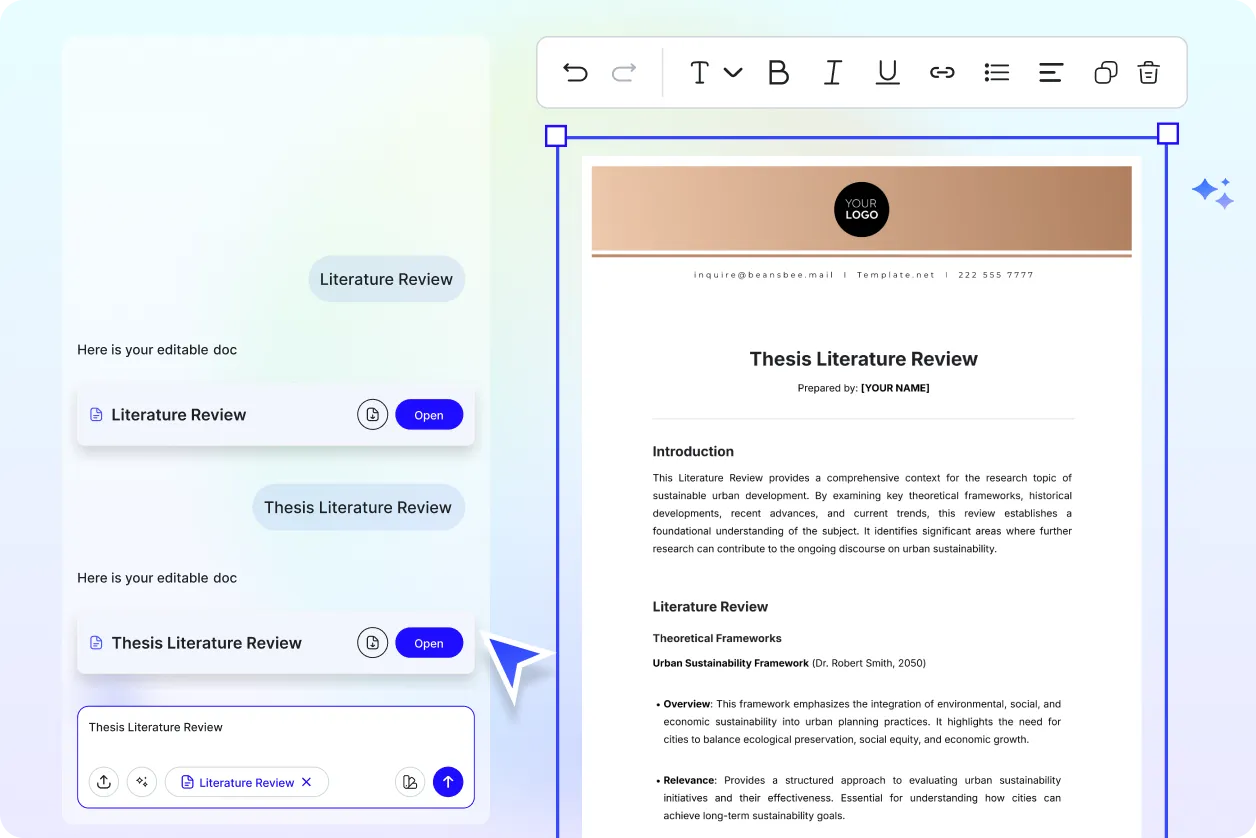
Reuse, Repeat, and Scale Easily
Save high-performing literature reviews as reusable templates. Adjust details and resend across campaigns or departments without rewriting from scratch.
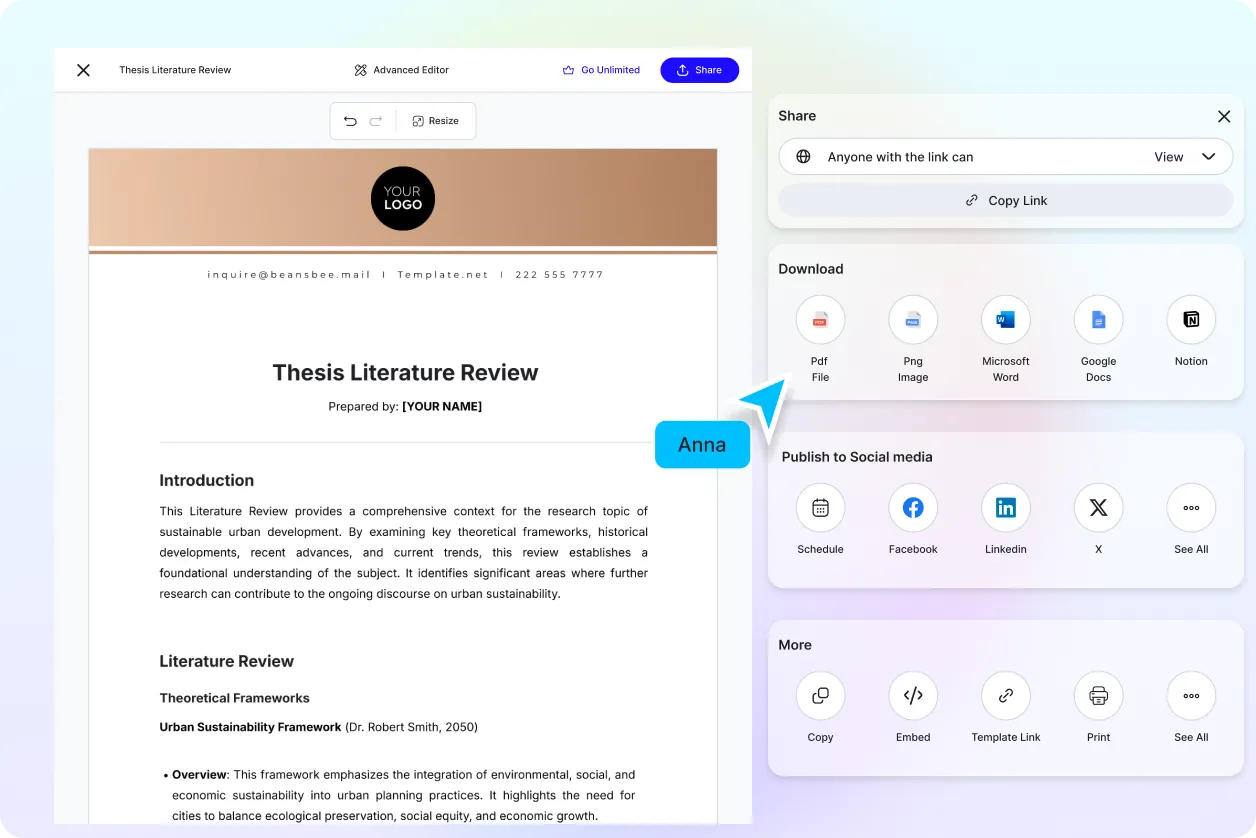
Share Instantly, Collaborate Smoothly
Download or post reviews in DOCX, PDF, TXT. Share online, collaborate live, and receive feedback, without scattered emails or files.
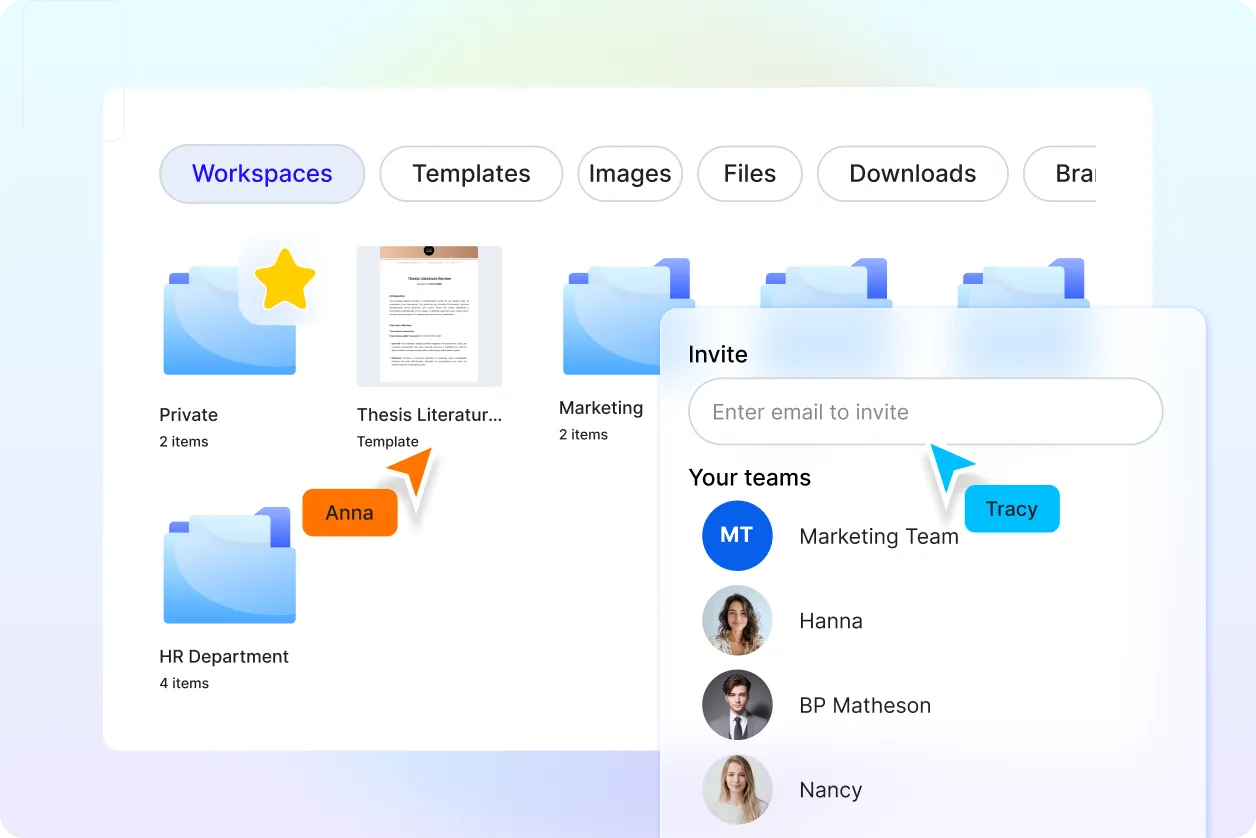
Smart Workspaces for Teams
Create centralized hubs for review projects. Assign access levels, store brand elements, and keep every asset aligned across teams.
Literature Review FAQ
What is a literature review and how is it used?
A literature review is a structured academic summary of existing research on a specific topic are often used in theses, dissertations, journal submissions, proposals, or reports. It helps convey scholarly insights clearly and professionally by comparing, analyzing, and synthesizing previous studies.
How do I write a literature review using AI?
Simply enter a short prompt like “review on climate change impacts” or “literature review on AI in healthcare,” or speak it using voice input. The AI instantly generates a complete, grammatically correct review with appropriate tone, structure, and formatting, ready to edit, share, or download.
Can I generate reviews in different languages or regional formats?
Yes. You can create fully formatted, editable reviews in 20+ global languages using text or voice prompts.
Languages supported: English, Spanish, French, Hindi, Arabic, Chinese, Portuguese, Bengali, Russian, Japanese, German, Korean, Italian, Turkish, Vietnamese, Urdu, Persian, Polish, Thai, and Punjabi.
The AI also adjusts formatting for US, UK, EU, and other regional academic styles.
How can I export or share my review?
You can download your review in DOCX, PDF, or TXT, or copy it directly into email platforms or academic workspaces. Share via email, public link, QR code, or post to platforms like LinkedIn, WhatsApp, Facebook, X (Twitter), Reddit, and more.
How do I format a professional literature review correctly?
A properly formatted review includes: title, abstract (if needed), introduction, body with citations, and conclusion, aligned with APA, MLA, or other citation styles. AI takes care of academic formatting automatically based on your chosen structure.
Can I rewrite or improve an existing review with AI?
Yes. Just paste your existing draft, and the AI can rephrase, expand, shorten, or improve tone and clarity, while maintaining your core message and references.
Can I add citations, visuals, or other elements to my review?
Absolutely. You can insert digital citations, attach PDF sources, and add images, graphs, charts, tables, and maps, or visual elements like academic logos. It’s perfect for creating peer-reviewed or professional-grade documents.
Similar Free Document Generators

Document Generator

Resume Generator

Budget Generator

Business Name Generator

Lesson Plan Generator

Story Generator

Summarize Text Generator

Essay Generator

Mission Statement Generator

Itinerary Generator

To Do List Generator

CV Generator

Meal Plan Generator

Business Proposal Generator

Cover Letter Generator

Business Plan Generator

Checklist Generator

Smart Goals Generator

Executive Summary Generator
